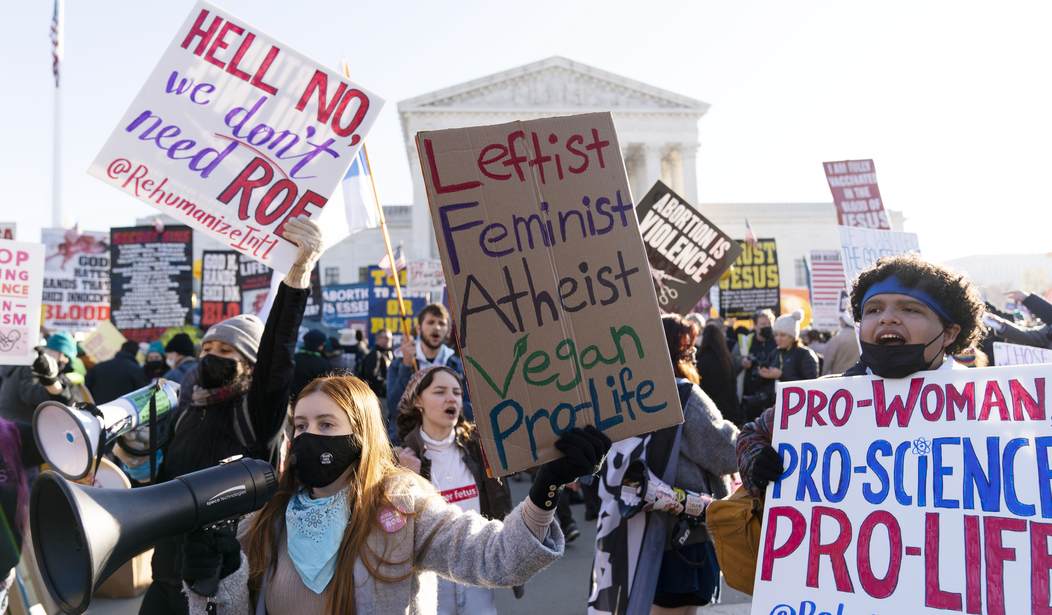A few notes from the end of the world, brought to you by the Washington Post, which apparently has a crystal ball that sees as far ahead as late June. The news section painted the outcome as all but certain — a Roe repeal that would energize Democrats in the upcoming midterms and “reshape the electoral battlefield”:
Democrats immediately signaled they would aim to make abortion rights a central focus in next year’s midterm elections, where their prospects have been viewed as dim, while many Republicans sought to keep the focus on inflation and other problems facing President Biden.
“This is an attack on women to make their own health-care decisions. Their families, it’s up to them,” said Sen. Patty Murray (Wash.), a former chair of the Democratic Senatorial Campaign Committee. “To have politicians decide to me is just frightening, and I expect a lot of voters will react to that.”
Sen. Rick Scott (Fla.), chairman of the National Republican Senatorial Committee, in contrast demurred when asked whether he believes abortion will be a motivating issue for Republican voters.
“They’re talking about inflation. They’re talking about the border. They’re talking about the Afghanistan debacle. They’re talking about parental involvement in education,” Scott said. “If you look at the polls and what people are caring about, that’s what they’re focused on.”
The differing responses framed a central question: Would Wednesday’s bombshell Supreme Court argument, where the conservative majority suggested it was prepared to sharply cut abortion rights, energize liberals after decades when the issue has been a more powerful motivator for the right?
Here’s a better question: how many people base their voting decisions on a Supreme Court argument? Especially in the midterms, which has next to no impact on the judiciary anyway? Midterms are a referendum on first-term presidents, not Socratic exercises in the court’s chambers. If the court overturns Roe in June, perhaps that might change, but even that’s wishful thinking. The likeliest immediate impact from overturning Roe would be that abortion would remain legal in almost every state, with more restrictions in states where abortion is less popular.
And that assumes that most voters have abortion as their primary issue. Overturning Roe might impact that as well, but most voters will have the economy at the top of their minds, as that impacts them every single day. That’s especially true given the split on abortion in the electorate, and the lack of support for the Casey position of almost unrestricted abortion on demand:

When asked to assign themselves to a pro-life or pro-choice position, Gallup respondents split 49/47 in slight favor of pro-choice. That doesn’t portend a massive correction in the midterms in the wake of a Roe dismantling, especially when the immediate impact will be almost nil. Only 32% of Americans want abortion legal under any circumstances, after all, and they’re almost certainly already voting for Democrats.
The panic has made even the normally rational Ruth Marcus lose her grip:
Roberts’s comments were the good news. Justice Brett M. Kavanaugh seemed to be setting the stage for going further. In the guise of asking questions, he laid down the marker that granting Mississippi’s request to overrule Roe wouldn’t interfere with any state that wanted to keep abortion legal.
Kavanaugh sought to position the court, in the event it takes that step, as merely saying that the Constitution is “neither pro-life nor pro-choice” but “scrupulously neutral” on the matter of abortion. Oh, please. Declining to protect the right to abortion is no more a decision not to take sides than is declining to protect the right to vote, or the right to worship freely, or the right to own guns. It is saying that the court has chosen to allow states, by majority rule, to interfere with the private decision-making of women who want to terminate their pregnancies.
Ahem. The right to worship freely, the right to own guns, and even the right to vote are explicitly mentioned in and protected by the Constitution (First, Second, Fourteenth, and Fifteenth Amendments respectively). Where exactly is the explicit mention of “abortion”? Or “reproduction”? Or for that matter, “privacy”? This was Clarence Thomas’ point in asking Julie Rikelman to point out where in the Constitution this “right” exists. It doesn’t, which is why Kavanaugh asked the parties to explain why the court shouldn’t remain neutral on this and allow the states and the people to deal with the issue — as the Tenth Amendment dictates.
If Marcus thinks this should be enshrined in the Constitution, well, there’s a process for that. It’s called a constitutional amendment, and it’s been used 17 times since the Constitution was first adopted. Otherwise, issues not mentioned in the Constitution aren’t “rights,” and are matters for the democratic institutions to deal with rather than the judiciary.
All of this is premature anyway. Yes, the questioning did make it sound as though this court will finally dispense with the ludicrous Roe decision that discovered a “constitutional” right by examining an emanation from a penumbra, or vice versa, but this particular court has been less than courageous on much easier questions of constitutionality. It took them three tries to enforce the First Amendment in the wake of pandemic-related closures of churches by jurisdictions that let other businesses operate, for instance. If this is the end of the world as we know it, the new one still looks like a dead ringer for its predecessor, at least for now.







Join the conversation as a VIP Member